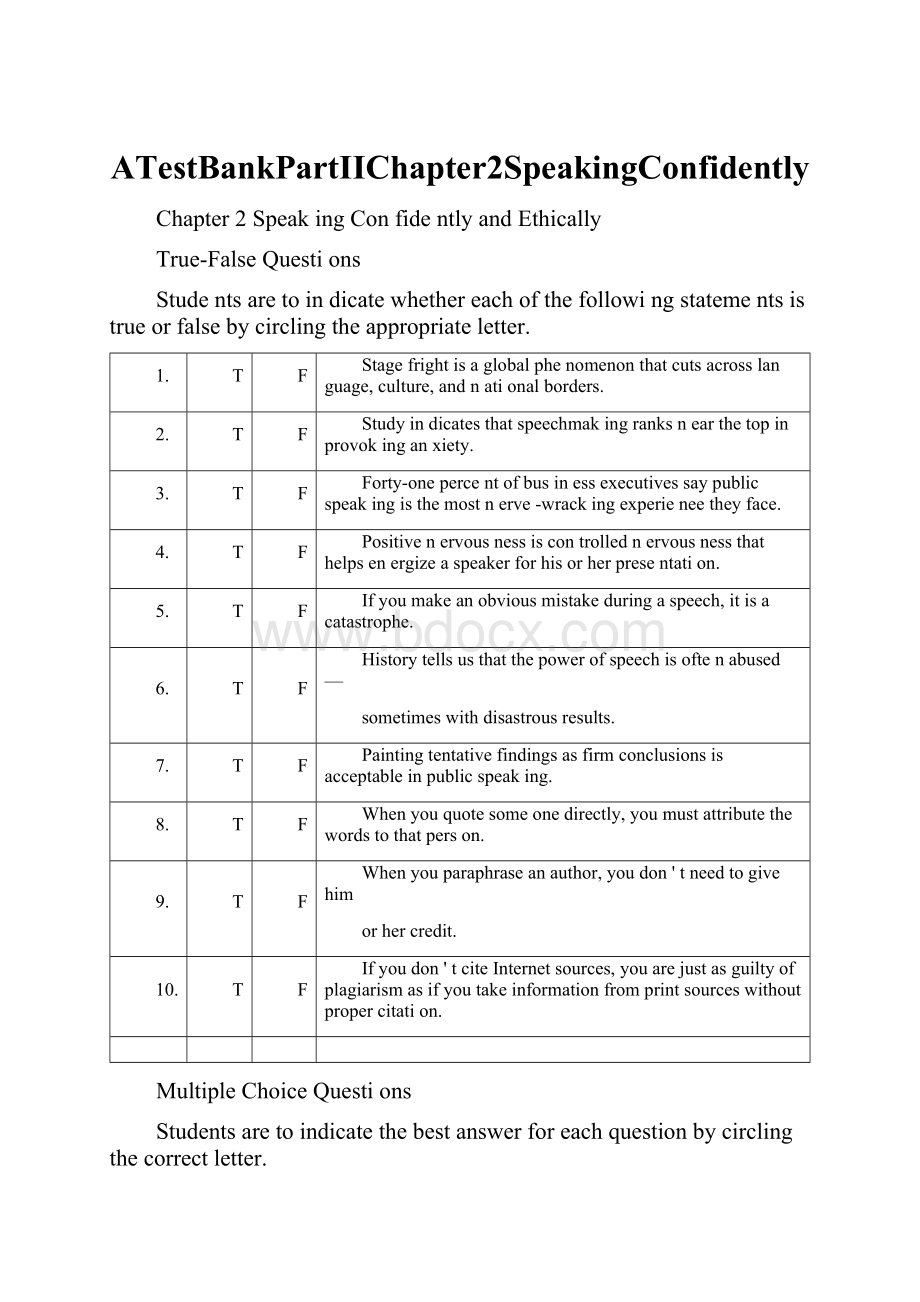ATestBankPartIIChapter2SpeakingConfidently.docx
《ATestBankPartIIChapter2SpeakingConfidently.docx》由会员分享,可在线阅读,更多相关《ATestBankPartIIChapter2SpeakingConfidently.docx(13页珍藏版)》请在冰豆网上搜索。

ATestBankPartIIChapter2SpeakingConfidently
Chapter2SpeakingConfidentlyandEthically
True-FalseQuestions
Studentsaretoindicatewhethereachofthefollowingstatementsistrueorfalsebycirclingtheappropriateletter.
1.
T
F
Stagefrightisaglobalphenomenonthatcutsacrosslanguage,culture,andnationalborders.
2.
T
F
Studyindicatesthatspeechmakingranksnearthetopinprovokinganxiety.
3.
T
F
Forty-onepercentofbusinessexecutivessaypublicspeakingisthemostnerve-wrackingexperieneetheyface.
4.
T
F
Positivenervousnessiscontrollednervousnessthathelpsenergizeaspeakerforhisorherpresentation.
5.
T
F
Ifyoumakeanobviousmistakeduringaspeech,itisacatastrophe.
6.
T
F
Historytellsusthatthepowerofspeechisoftenabused—
sometimeswithdisastrousresults.
7.
T
F
Paintingtentativefindingsasfirmconclusionsisacceptableinpublicspeaking.
8.
T
F
Whenyouquotesomeonedirectly,youmustattributethewordstothatperson.
9.
T
F
Whenyouparaphraseanauthor,youdon'tneedtogivehim
orhercredit.
10.
T
F
Ifyoudon'tciteInternetsources,youarejustasguiltyofplagiarismasifyoutakeinformationfromprintsourceswithoutpropercitation.
MultipleChoiceQuestions
Studentsaretoindicatethebestanswerforeachquestionbycirclingthecorrectletter.
1.MahatmaGandhi,AbrahamLincoln,andWinstonChurchillareamongthe
greatestpublicspeakersinhistorywhohavesufferedfrom.
a.speechimpediment
b.stagefright
c.nervousbreakdown
d.emotionalstress
2.Mostexperieneedspeakershavestagefrightbeforetakingthefloor,but
theirnervousnessisasignthattheyaregetting“psychedup
foragoodeffort.
a.healthy
b.lucky
c.desirable
d.positive
3.Formostpeople,thepartofstagefrightisfearoftheunknown.
a.easiest
b.biggest
c.smallest
d.deepest
4.Astandardruleisthateachminuteofspeakingtimerequiresof
preparationtime——perhapsevenmore,dependingontheamountof
researchneededforthespeech.
a.10to20minutes
b.20to40minutes
c.oneandhalfhours
d.onetotwohours
5.Oneprofessionalspeechconsultantestimatesthatproperpreparationcanreducestagefrightbypercent.
a.75
b.50
c.35
d.80
6.Foreachnegativethought,youshouldcounterwithaminimumof
positiveones.
a.six
b.three
c.five
d.two
7.Visualizationiscloselyrelatedtothinking.
a.positive
b.critical
c.negative
d.creative
8.Accordingtoyourtextbook,ratherthantryingtoeliminateeverytraceof
stagefright,youshouldaimattransformingitinto.
a.generalanxiety
b.visualizedadrenaline
c.professionalstagefright
d.positivenervousness
9.Whichofthefollowingstrategiesisleastlikelytohelpyoudealwith
nervousnessinyourspeeches?
a.Thinkingpositively.
b.Workingespeciallyhardonyourintroduction.
c.Concentratingonyourstagefright.
d.Makingeyecontactwithmembersofyouraudienee.
10.Athletes,musicians,actors,speakers,andothersusevisualizationtoinstressfulsituations.
a.boosttheirconfidenee
b.enhancetheirperformanee
c.increasetheircreativity
d.improvetheirchancesofsuccess
11.Themoreyourmentalpictures,themoresuccessfulyouare
likelytobe.
a.vivid
b.real
c.lucid
plete
12.WhichofthefollowingpointsisNOTlistedinthetextasadditionaltipsfordealingwithnervousness?
a.Beatyourbestphysicallyandmentally.
b.Workespeciallyhardonyourconclusion.
c.Makeeyecontactwithmembersofyouraudienee.
d.Usevisualaids.
13.WhichofthefollowinggoalsisNOTconsideredethical?
a.Supportingaworthycause.
b.Reportingonabusinessproject.
c.Defraudinginvestorsoftheirsavings.
d.Helpingaclassmatewhoissick.
14.BeingpreparedforaspeechinvolvesallofthefollowingEXCEPT
a.analyzingyouraudienee
b.creatingvisualaids
c.organizingyourideas
d.talkingtoafriend
15.Nothingismoreimportanttoethicalspeechmakingthan.
a.honesty
b.sincerity
c.curiosity
d.credibility
16.Blatantcontemptfortheisonekindofdishonestyinpublic
speaking.
a.facts
b.truth
c.proof
d.context
17.WhichofthefollowingexamplesisNOTlistedinyourtextasamoresubtleformofdishonesty?
a.Jugglingstatistics.
b.Quotingoutofcontext.
c.Rehearsingyourdelivery.
d.Misrepresentingsources.
18.plagiarismisthemostblatantandunforgivablekindof
plagiarism.
a.Strategic
b.Global
c.Patchwork
d.Incremental
19.Thebestwaytoavoidglobalplagiarismisnotto.
a.leaveyourspeechuntilthelastminute
b.downloadaspeechfromtheInternet
c.deliveryourfriend'sspeechasyourown
d.gathersupportingmaterialfromonlinesources
20.Whenaspeakercutsandpastesfromtwoorthreesources,withoutgivingcreditandwithoutdoinganyadditionalresearch,heorshecommitsplagiarism.
a.patchwork
b.fragmentary
c.piecemeal
d.disorganized
21.plagiarismoccurswhenthespeakerfailstogivecreditfor
particularpartsofthespeechthatareborrowedfromotherpeople.
a.Partial
b.Incremental
c.Scattered
d.Incomplete
22.Onewaytoavoidpatchworkplagiarismorincrementalplagiarismwhen
workingwiththeInternetisto.
a.takecarefulresearchnotes
b.usecrediblesources
c.quotemultipleauthors
d.citerelevantinformation
23.Becausespeechmakingisaformofpower,wemustalwaysbesuretospeak
a.concisely
b.persuasively
c.ethically
d.forcefully
24.Inpublicspeaking,soundethicaldecisionsinvolveweighingapotential
courseofactionagainst.
a.asetofethicalguidelinesorstandards
b.thespeaker'sstrategicobjectives
c.asociallyacceptedcodeoflegalrules
d.thepersonalopinionsofthespeaker
25.WhichofthefollowingisNOTpresentedinyourtextbookasaguidelineforethicalspeechmaking?
a.Behonestinwhatyousay.
b.Explainyourcredibilityonthespeechtopic.
c.Befullypreparedforeachspeech.
d.Makesureyourgoalsareethicallysound.
26.WhichofthefollowingisNOTpresentedinyourtextbookasaguidelineforethicalspeechmaking?
a.Explainyourmotivesforspeakingtotheaudienee.
b.Putyourethicalprinciplesintopractice.
c.Avoidname-callingandotherformsofabusiveIanguage.
d.Makesureyourgoalsareethicallysound.
27.Havingspenttwoyearsworkinginatelevisionnewsroom,XiaoLingdecidedtogiveherinformativespeechonthattopic.Becausesheknewalotaboutit
andwascomfortablespeakingtoanaudienee,shedidn'tspendmuchtime
preparing.Asaresult,herspeechwaspoorlyorganized,ranovertime,anddidnothaveaclearmessage.WhichguidelineforethicalpublicspeakingdiscussedinyourtextbookdidLiYingfailtoliveupto?
a.Befullypreparedforeachspeech.
b.Makesureyourgoalsareethicallysound.
c.Avoidname-callingandotherformsofabusiveIanguage.
d.Behonestinwhatyousay.
28.Accordingtoyourtextbook,globalplagiarismoccurswhenaperson.
a.baseshisorherspeechcompletelyonforeignsources
b.failstocitesourcesthroughoutthebodyofthespeech
c.takesaspeechentirelyfromonesourceandpassesitoffasherorhisown
d.usestwoorthreesourcesandblendstheinformationintoaunifiedwhole
29.LiuWeifoundseveralexcellentsourcesforhisinformativespeech.He
pulledkeyinformationfromthem,blendedthoseideasintohisownperspective,andcitedhissourceswhenhepresentedthespeech.Whichofthefollowingstatementsbestdescribesthissituation?
a.LiuWeiisethicalbecausehecitedhissourcesandusedthemtodevelophisownslantonthetopic.
b.LiuWeiisguiltyofincrementalplagiarismbecauseheusedquotationsandparaphrasesfromotherpeopleinhisspeech.
c.LiuWeiisethicalbecausehedidnotcopyhisspeechfromasinglesource.
d.LiuWeiisguiltyofpatchworkplagiarismbecauseheusedideasfromseveraldifferentsourcesinhisspeech.
30.Accordingtoyourtextbook,lagiarismoccurswhenaspeaker
copieswordforwordfromtwoorthreesources.
a.patchwork
b.global
c.incremental
d.scientific
31.Asyourtextbookexplains,whatkindofplagiarismisaspeakerwhoassembles
aspeechbycopyingwordforwordfromtwoorthreesourcescommitting?
a.Global.
b.Incremental.
c.Scientific.
d.Patchwork.
32.Accordingtoyourtextbook,lagiarismoccurswhenthespeechas
awholeisethicalbutthespeakerfailstogivecreditforparticularquotations
andparaphrases.
a.patchwork
b.incremental
c.accidental
d.incidental
33.Whichofthefollowingdoesyourtextbookrecommendasawaytosteerclearofincrementalplagiarism?
a.Avoidusingdirectquotationsfromotherpeopleinyourspeech.
b.Onlyuseyouroriginalideassothereisnoriskofplagiarism.
c.Avoidcitingsourcesthatmightmakesomeonesuspectplagiarism.
d.Citethesourcesofallquotationsandparaphrasesinyourspeech.
34.Thethreekindsofplagiarismdiscussedinyourtextbookare.
a.validplagiarism,incrementalplagiarism,andnecessaryplagiarism
b.patchworkplagiarism,speechplagiarism,andglobalplagiarism
c.globalplagiarism,patchworkplagiarism,andincrementalplagiarism
d.ideaplagiarism,quotationplagiarism,andparaphraseplagiarism
a.listenattentively,avoidprejudgingthespeaker,andsupportfreespeech
b.listenattentively,takeaccuratenotes,andavoidprejudgingthespeaker
c.supportfreespeech,avoidname-calling,andlistenattentively
d.avoidstereotypingthespeaker,supportfreespeech,andtakeaccurate
notes
36.Heatherwasinthemidstofanexcellentspeechoncampushistorywhenshemadeaminormistakebygivingthewrongdatefortheop